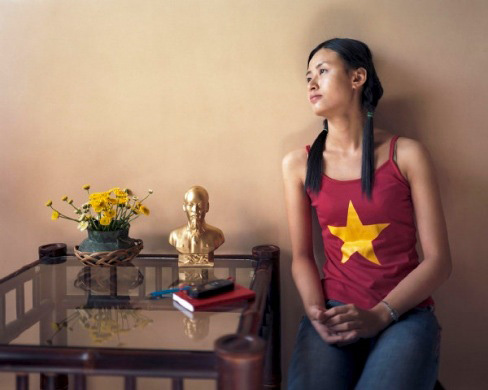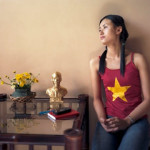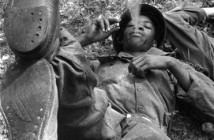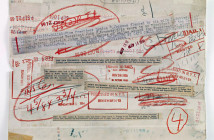EXHIBITION BY PHOTOGRAPHER BRIAN DOAN SPARKS PROTEST
A few weeks ago, an exhibition in Santa Ana, California at the VAALA (Vietnamese American Arts & Letters Association) Center sparked protests from the Vietnamese community. The group show, F.OB. II: Art Speaks drew some controversy with an image by photographer Brian Doan. Doan's image depicted a Vietnamese girl wearing a red tank top with a yellow star on it (referring to the communist flag of Vietnam) while sitting next to a bust of former communist leader Ho Chi Minh.
Doan's photograph was vandalized on a number of occasions during the exhibition. The glass protecting the image was scratched, a woman protestor spit on it, and someone sprayed red paint on it and attached a tampon and underwear to it. Reversing his original stance, the curator of the exhibition decided to close the show two days early because The City of Santa Ana notified VAALA that they did not have proper permits to use the space as a gallery.
Doan creates photographic portraits of Vietnamese people for memory, and it is his passion. He cares greatly for his heritage, and it is the mainstay in all of his work. After the VAALA show closed, Doan's images were featured in two solo exhibitions at Cypress College, The Vietnamese and Echoes of The Land. The faculty, staff and Dean at the college were well aware of what happened in his prior exhibition and took precaution by putting the vandalized, framed photograph in a glass case and revealed it the night of the opening. Sure enough, some more protesters came, TV and news crews came, and it got to the point that the school decided to host a debate with people from the Vietnamese community and Doan a few days later. The debate began as a single-sided assault on Doan, being verbally attacked and labeling him a communist, all the while Doan sat and listened. It settled down slightly once a moderator stepped in and Doan was able to defend his work. The comments eventually took a toll on his Father who insisted that Doan remove the work from the show. This is the second time in as many weeks that Doan and his father have been at odds with his work.
I had a chance to interview Brian recently about his ordeal, attached is an excerpt:
Jason Landry: The staged narrative is a technique that many contemporary photographers utilize when they create a photograph. It is a way to create a discourse of something that normally isn't there. It makes you think and react. Is that what you did in this image?
Brian Doan: It was totally staged. Almost all of my work is about the narrative. I create work in many layers, combining history and props to tell a story. I wanted to capture what it is like for the younger Vietnamese generation growing up in Vietnam now. I purchased the t-shirt, had her put her hair up in a ponytail because during communist times, this was how I remember women wearing their hair. I also put a red book on the table with a cell phone on top of it. Some may take it as making fun of how Chairman Mao in China made people carry around a red book with his quotes, but all I'm really commenting on is that the cell phone is now more important than the book. I directed the girl to look away as if she were dreaming. That's it. Now they are protesting the nudes that are in the show, so it has become an immoral thing based on Vietnamese culture and value, not just a political thing.
JL: From what I can understand from the various articles that have been written about the protest, many of the citizens in Little Saigon have expressed that you are trying to flame an old wound, that you are a communist looking to make trouble. What is your reaction to these claims?
BD: I'm hoping that when they see the series as a whole, they will understand more about me and what I do as an artist. I have begun to get hate e-mail, dirty e-mails, illustrations, and phone calls that are very disturbing and threatening. It is interesting that a little image can stir up a big mess. What can you do…you have to move on.
JL: Your own Father said during the VAALA exhibition protest that he disapproved of your work. Have you had a chance to speak with him since the protest?
BD: I will speak with him when everything settles down. He doesn't want to talk with me right now.
JL: How did his comments make you feel?
BD: I feel sad. This isn't the first time and it didn't totally shock me, but at this point, they should stand behind my work and believe in me.
JL: What do your students think of this situation?
BD: They all support me and believe I'm doing the right thing. Some of them blog about it and post their opinions and comments online. They believe I'm a good person and a good teacher.
JL: Do you think that you will have a problem if you get back to Vietnam?
BD: Most likely. I'm sure they will know more about me now as the person who makes fun of their leader. I was hoping to go back one more time to work on my project, but it doesn't look good. It has now put me in a very uneasy situation. I'm not pro or anti-Communist; I'm just an artist.
- Brain Doan, Thu Duc, 2008.
Vietnamese American Arts & Letters Association
Image courtesy of the artist.




